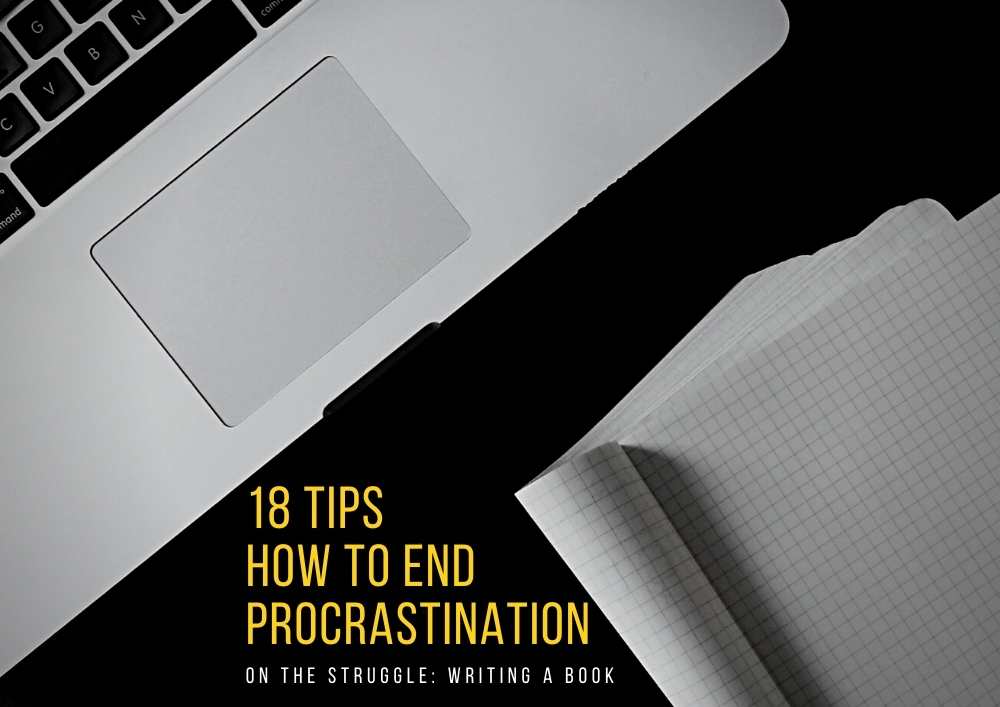18 Tips: How to end procrastination writing a book

This is a case study on ending procrastination with a focus on procrastination & writing a book.
- Are you stuck with writing a book?
- Are you feeling like a donkey standing in front of a mountain not knowing what to do next?
- Do you find it funny or quite ironic that you were the muse or inspiration for someone else who wrote a book but are now stuck and procrastinating yourself?
- Are you blind to your own blind spots when it comes to how to end procrastination writing a book?
Knowing how to become productive again is the antidote to procrastination. And these tips can be transferred to so many other topics or areas of your life, besides writing a book.
Read through the tips and notice what procrastination trap you’ve stepped into 😀…
Tip 1: Make sure you actually want to write a book – to end procrastination writing a book
You know, very few things in life are things we need to do. It’s your choice to do something or not. Make sure you want to write this book. You feel good about this project. You know you will benefit from it and what you want to produce. Hint: it’s totally fine to write the book just for you. I’ve talked to people who have overcome disease and wanted to write down their stories. This story is pretty much their life story. It is totally fine to write this book just for you.
I know it’s popular to write a book nowadays. Please check in with yourself. If you don’t want to write the book or it’s currently too complicated for you to write it – you don’t have to. Choose your struggle or challenge. You can also decide to write your book a year from now. Not now doesn’t mean never – by all means. You know your priorities.
Tip 2: Remember who you’re writing the book for – to end procrastinating writing a book
Writing a book is big. You may have forgotten in the process who you’re writing this book for? Who is your audience? Why is it dear to your heart that you bring your words on paper or in form of an ebook? What is that book supposed to do with your audience? What kind of problem would it solve for them? Who are you trying to reach with your message? How will these people feel once they read your book? What will it do for them? When we detach from our audience we can lose the drive or meaning to finish this project and make it available to people. Stay connected to your potential readers. And if you plan to write this book just for you (to remind you of something/ to document something you’ve experienced and overcome/ or just because it is your hobby to write a novel) that is totally acceptable as well. No one needs to read the book. You can totally create it for your pleasure only. You can set it as a goal to write a book without having it published or being read by other people.
Tip 3: Rember the goal of the book – to end procrastinating writing a book
Sometimes we forget why we started with this crazy, long-term idea of writing a book in the first place. So remember, what do you hope to achieve with this book? We already mentioned it in the previous tip to have your message connected to your audience. Now go back to exactly what your message is. What do you want to say and why? Is there an internal urge inside you? I’ve talked to many people who’ve had this internal urge inside them for years! Follow it. Or is it because people have told you repeatedly that you really should share this message/these tips/write a fictitious novel? Reconnect to the overall vision this book project is supposed to be a part of.
Tip 4: Develop your “author” persona – to end procrastination writing a book
It may be that you’re procrastinating because you don’t know who you are as an author. Just the thought of it sounds strange or ridiculous to you. No wonder you can’t identify with writing your message. Reflect: who is this author persona that I want to become? Imagine yourself as an author. Is there a doubt that you’re not good enough? Remember that you’re absolutely capable of producing results (with that I mean your book). I’m sure you’ve created many great results in your life so far. Especially when it’s the first time you’re writing a book it can be hard to think of yourself as an author. You are good enough and you will only get better if you do the work and create habits that make it easier over the long run to pull through. Is this author a person who gets up at 5 am to have an hour to write? Is this author a person who has “sacred Saturday writing meetings” scheduled in the calendar? Who do you need to become to deliver this awesome piece of a book?

Tip 5: Stop being afraid you’ll be locked in – to end procrastination writing a book
You may be afraid that having produced a finished book will say something about you. You may think people will find you hideous. We all know people are so busy dealing with their own life that they rarely listen to us consciously when we’re talking. Also, you may think people will judge you once you’ve presented your finished book. The social media algorithm is going to show your posts to a small group of people anyway unless you pay for it in form of ads. It is an illusion that all of a sudden the word will get out and everyone and the whole world will judge you for your writing. A book is a book and not more. You are not defined by the outcome you produce. After all, this book will reflect one point in this long journey in your life. So you might as well get started with it right now.
Tip 6: Slip into the next stage – to end procrastination writing a book
You’ve been at the visionary phase where you imagine how great it would be to write your book. You were excited. You knew why you wanted to write the book. That’s wonderful. It’s so crucial to have positive emotions connected to our goals because positive emotions give us drive. Having a vision is crucial. Next, you need to chunk this big vision down into smaller, manageable steps and develop an action plan because it’s time to move into the implementation stage.
This is the stage where fear might kick in: the implementation stage. You gotta do it. You gotta get into action to write your words, finish your pages and chapters and produce something. It’s funny that the “doing-part” quite often makes us uncomfortable and stops us from moving ahead. After all, you’re just sitting down with your laptop (or pen & paper, but mostly a laptop) and moving your fingers to create some words on a word or google doc. Nothing frightening about that, is it? It’s also entirely up to you what you write about. It’s all in your control. And that’s wonderful.
Tip 7: Develop an outline – to end procrastination writing a book
You don’t want to get lost in the endless jungle of messages you want to convey with your book. It’s easier to procrastinate if we don’t know where we’re going! Reflect: what are the topics you want to write about? What is your table of content? This is not set in stone but try to come up with some cornerstones you want to treat in your book to end procrastination writing a book. If you’ve done that already, that’s great. Go back to your outline. Get into one chapter and focus. Do not jump into a different chapter unless you’ve written what you wanted to write about that chapter. Having a structure, an overview, to hold on to can be a huge help in this creative process and stop you from procrastinating. And if you already know there will be subheadlines then include those subheadlines. Don’t segregate it too much. If you feel like these subheadings will help you to remember what you want to cover in the main chapter then write them down, by all means. You can always change the headline organization after you’ve produced your first draft.
Tip 8: Break writing a book down into smaller steps – to end procrastination writing a book
You may have noticed by now that writing a book is a huge project. So you may have gotten lost in this process. When we think too big we can easily get lost. So you need to chunk your big book project down into smaller, manageable sub-projects and tasks. Meaning: focus on finishing one thing at a time. Focus on finishing one chapter before you move to the next.

Tip 9: Remember that you’re working with an adjustable text editor – to end procrastination writing a book
You have these convenient keys and shortcuts to cut out parts of what you’ve written and paste them to a different section in your book. If you figure out in the process that something you’ve written fits better at a different place – by all means – change it. It’s up to you. Just make sure that you don’t hold yourself up constantly changing what you’ve written. The goal is really to get in the writing flow and produce the first version. You can do the several stages of fine-tuning later.
Tip 10: Schedule your writing time – to end procrastination writing a book
We know life is busy. Things can come up. Unexpected emergencies. Therefore you need to plan and schedule your writing time. Writing time can easily get lost when we prioritize other tasks higher. And once you’ve fallen off your routine it may take some time to get settled in again in your writing routine. I’m sure you’ve heard “If it’s not scheduled, it’s not real.” Do yourself a favor and take this project seriously while having fun with it. Schedule your writing time.
Tip 11: Get into it for 5 minutes – to end procrastination writing a book
It may be uncomfortable to get into the writing mode. Get yourself a jug of water, a glass of water, eliminate distractions, maybe set a timer to work on it for 50 minutes, and get started. We often need just 5 minutes to get into the knowledge of where we’ve left last time. It often takes just 5 minutes to start liking a task again. If you just dedicate a couple of minutes to this task you may find that you’re already in this task. Just get started.
Tip 12: You decide continuously what you share – to end procrastination writing a book
It’s up to you what parts you want to cover in your book and how much in detail. You don’t have to write about things you feel uncomfortable with. Likely, this process of writing a book will push you mentally, emotionally, your organization, your time management. So prepare to feel slightly uncomfortable sometimes but also amazed and proud of your progress. Nothing is set in stone. I strongly encourage you to write it out and allow yourself to get into the writing flow. Remember, you can always delete parts in your editing phase later on.
Tip 13: Allow creativity to pop in – to end procrastination writing a book
While you’re all consumed in writing your first draft pay attention to when creativity knocks on your door. Meaning when an idea enters your mind. Writing is a creative process so it may trigger memories and stories. Take note when something comes up that says “I should write about that!”. Listen to your gut while writing. Have fun with your intuitive hits and allow yourself some wiggle room to tell your story. Just stay focused on the chapter you’re currently writing. Create a little note of where you want to use this intuitive hit in your book. Then get straight back into the chapter you’re currently writing. It’s important to avoid content and context switching. It’s crucial to stay dedicated to one task and get this one done first. You can handle all that creativity and stay focused.
Tip 14: Think in versions – to end procrastination writing a book
Quite often we want to do it perfectly. You may step into the perfectionist trap. Take it lightly. Writing a book should be enjoyable and this is a huge project.
Focus on finishing the first version to end procrastination
Make sure you create a finished draft. If you’ve ever written a bachelor’s or master thesis or a policy at your company you know that there’s so much other work coming along after you’re done with version number one. Focus on what’s relevant right now. And that is knowing where you’re going, what you want to achieve, knowing your outline, and finally writing your first version.
Focus on proofreading & re-organizing to end procrastination
After you’ve written what you wanted, you enter the proofreading and re-organizing stage. You may notice that you’ve repeated yourself over and over. While it may be important to stretch crucial passages that we want the reader to remember you may want to shorten what you’ve written. You may want to move parts of what you’ve written to a different chapter. Go ahead. Change it but don’t overthink it. Most things we mention at some part in a chapter can also be told at a different place.
Consider giving your book version to an external party for review to end procrastination writing a book
It’s often a good idea to get external feedback. You’ll gather information on what part resonated with your reader the most. You’ll get feedback on whether something was clear or was repeated too often. Make sure to give your version to people that are close to your audience and give them a deadline. You don’t want to get into the trap that you’re waiting and waiting on external feedback.
Create your final version to end procrastination writing a book
This is a huge step. Make the final changes and then let it go. You’ve arrived at your final version! Don’t get into the trap of becoming too picky or overcorrect. Done is better than perfect. The next tip continues directly from here.

Tip 15: Think in editions – to end procrastination writing a book
There are so many wonderful books out there that get updated and published again as a second edition. If you feel that you want to include case studies or practical examples in your book – you can do so in your second version. If you feel that you want to include a foreword or afterword – you can do so in your second version. How to end procrastination writing a book means that you’re committed to moving ahead with your book baby. We can only become better if we do the initial work and that is producing the first draft, reworking it, revising it, changing it, publishing it, and potentially creating new editions of it.

Tip 16: Accept that you’re sometimes more productive than on other days – to end procrastination writing a book
Truth is, on one day you may write one page. On another day 5 pages. You may even have a streak on another day. And then on another day – nothing – because you write, delete, write, delete. Or you read it over and over it. Beware our upper limit bias. Some major achievements (like a writing streak) may trigger some internal blocks. Don’t judge yourself when you’re not getting the result you hoped for. Tomorrow is a new day. You always have a chance. And if you’ve ever worked on something for a longer time you may figure that this work is worthwhile (like training to become a better runner, improving your IT skills,…). We learn in circles. You don’t become an expert when you’re just a beginner in writing a book. We develop our skills and confidence in circles. There may be days that are more productive than others. That’s normal and fine. Writing a book is like growing a plant. Every day happens growths and it takes some time until a seedling grows into a little and then bigger plant.
Tip 18: Surround yourself with people who have the same goal – to end procrastinating writing a book
It’s much easier to progress when you’re in a positive, goal-oriented environment that supports your vision and holds you accountable to the goals and sub-goals you have set for yourself. This means: get yourself into a group of like-minded people that hold you accountable, like in an accountability pod. Get yourself into a group that is working on achieving the same goal as you are working on. These people may have overcome the same obstacles as you are struggling with right now. Their feedback and advice may be exactly what you need. They may also have useful contacts when it comes to promoting your book or have an external party you can refer to for proofreading or formatting.
Tip 17: Give yourself a break from writing the book – to end procrastination writing a book
It can be exhausting being consumed by the idea of writing a book. If you think 24/7 just about this it can create a lot of pressure. The same goes if you deal with your two kids, run your business, and want to write this book on the side. Don’t even get into overwhelming or pressuring yourself. Give yourself breaks, meet friends, do things you enjoy. Stay connected to the real world. This book can and will develop over time. Stay consistent but keep living your life.

About the author
Tina Helmreich provides productivity solutions for individuals and is a business consultant for corporate businesses working on international, financial, and IT-related projects.
Tina has lived in Switzerland and Finland and worked in Canada, the US, China, and Austria.
Early on, she was fascinated by the way people arrive at a decision and how satisfied people are with their life. Delays, unsatisfying results, or misunderstandings are often rooted in a lack of communication or strategic orientation – and not missing skills or lack of ambition.
Tina decided to become a certified NLP trainer, according to the American Board of NLP, early on when she was still writing her master thesis on strategic decision making.
Today she uses her knowledge to help people and organizations filter through the noise and focus on what creates an impact. Her productivity solutions for individuals build on a person’s strength and integrate with the many facets of everyday life (social life, private life & work-life dynamics, health, rest & recovery, …) considering a holistic, productive, and doable solution to a person’s life.
Tina works remotely and in English with people from all over.
She loves helping businesswomen in particular who are already highly educated, self-aware, and are just a little bit scared to show up. Tina has the energy, positivity, and big-picture thinking to guide her students step by step to their solution.


